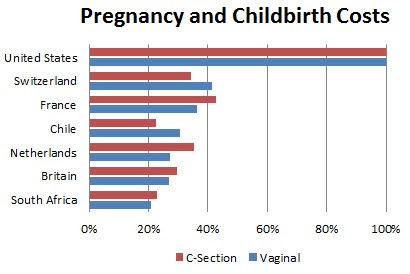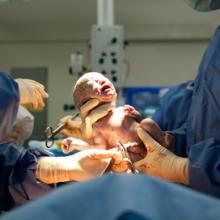Childbirth
IN THE EIGHTH season of Call the Midwife, set in post-war east London, nuns and nurse midwives of Nonnatus House assist a woman with severe complications from a “backstreet” abortion. Sister Julienne says to a young nurse, “The word ‘midwife’ means ‘with-woman.’ A woman in that situation needs somebody by her side.”
I’m pro-choice, which was an unpopular stance in the Catholic community I grew up in. For my views on reproductive rights, people in youth group called me a “baby killer” and “Pontius Pilate.” During Advent, specifically, I loathed the hollow teachings on Mary and childbirth. We sanitized the Nativity into a cute story — the equivalent of a Disney movie featuring a white family and a manger crowded with men. Only recently did I learn that some scholars believe that midwives attended Jesus’ birth. As reproductive freedom and care are further undermined in the United States, this is an apt time to reclaim a more feminist view of the Nativity and rethink Advent as the season of the midwife.
IN HER LATEST BOOK, Birthing Hope: Giving Fear to the Light, Rachel Marie Stone spiritually illuminates a painstaking, sometimes isolating, and often highly medicalized event in the life of a woman. In uncovering her own journey giving birth, Stone invites us to question our understandings of pain and passage, deliverance and rebirth, illness and privilege, and theology’s long-complicated relationship to science. Stone uses her new memoir to inspire readers to comb through scripture and rediscover God as midwife.
Throughout the book, Stone includes passages from Isaiah, which “imagines God as birthing mother and midwife more than any other biblical book.” Stone notes, “Christians across the spectrum of cultural, theological, and political points of view seem equally to neglect biblical images of God as a laboring woman.” Chapter by chapter, Stone writes of labor and birth from a variety of vantage points that affirm the God closely linked to childbirth: Teenage Mary, struggling with morning sickness and at the end of her third trimester, pushing the Christ through her birth canal and into the world. A Malawian woman who must walk many miles home with her newborn strapped to her back mere hours after birthing. The Christian understanding of “being born again” as forgiveness, a fresh beginning, and as entering “into the womb of God to be born again.” Each perspective expands the reader’s understanding of rebirth through God.
But wait! What if we‘ve got it backward? To revisit that waiting-goes-both-ways thing: Instead of us waiting on God, what if God is waiting on us?
John Dominic Crossan poses that question in his book The Power of Parable. He notes something that’s obvious: Jesus could be very impatient. He wasn’t one to just sit back and wait for things to change. As Crossan sums it up: “You have been waiting for God, he said, while God has been waiting for you. No wonder nothing is happening. You want God’s intervention, he said, while God wants your collaboration. God‘s kingdom is here, but only insofar as you accept it, enter it, live it, and thereby establish it.”
There’s so much to be done — what’s important is to do it now. This moment is a gift. This opportunity to love someone else is too precious to waste.
If all we do is sit and wait for things to change, then we’re like people trapped in a perpetual state of Advent. We never get to our own Christmas morning. We do nothing more than wait.
And all the while, someone is waiting on us.
After I blogged about expensive American childcare earlier this week, my daughter Molly directed me to a March of Dimes web page showing the extremely high rate of preterm births in the United States. "Born Too Soon," a 124-page report issued in 2012, "ranks the U.S. 131st in the world in terms of its preterm birth rate of 12.0 per 100 live births, almost tied with Somalia, Thailand, and Turkey. Nearly half a million babies are born too soon in the U.S. each year."
According to a 2009 report from the Centers for Disease Control, "the main cause of the United States’ high infant mortality rate when compared with Europe is the very high percentage of preterm births in the United States" — in spite of the fact that "infant mortality rates for preterm (less than 37 weeks of gestation) infants are lower in the United States than in most European countries." In addition, "infant mortality rates for infants born at 37 weeks of gestation or more are higher in the United States than in most European countries."
"American Way of Birth, Costliest in the World"
That's the headline of an article by Elisabeth Rosenthal in yesterday's New York Times. The article includes a chart comparing childbirth costs in seven countries. In the United States, the average amount paid for a conventional delivery in 2012 was $9,775; for a Caesarean section, it was $15,041. Those are the highest prices for childbirth anywhere in the world.
To get an idea of just how high, I made a chart using the figures in the NYT chart. Childbirth costs in the other six countries range from 21 percent to 43 percent of U.S. costs even though American women typically spend far less time in hospital.

South Africa is so dangerous for childbirth that its graph line would not fit on this blog page. For every 1,000 births, there are 56 infant deaths. For every 100,000 births, there are 400 maternal deaths. [Chart by L. Neff; data from WHO]
I wrote a story a while back about a family in our church back in Pueblo whose baby was due just after we left town. Early in the pregnancy, doctors diagnosed little Avery with HLHS, Hypoplastic Left Heart Syndrome. There was a good chance he’d need surgery in utero or immediately after being born, and there was a formidable chance that he wouldn’t survive the procedure. There was also, of course, a higher than normal risk to Lyndsay, the mother, too.
It was hopeful watching the church family rally around the Vigils, praying for them, bringing them meals, visiting and doing what they could to offer support in what I’m sure felt like a time of emotional free-fall. It was also weird to know that, when Avery actually came, we wouldn’t be there.
Avery's first day as an oxygen-breathing member of the human race.
That day was today.
Soon it will be Mother’s Day in the United States. For most women in developed nations, motherhood comes after months of joyful preparation to make sure the birth goes as smoothly as possible. But in places far away from the world of prenatal vitamins and baby showers, women routinely deliver their children at home, hundreds of miles away from the nearest doctor or midwife. This is the story of a health worker in South Sudan who is fighting for change and finding strength in his faith.

Ten more lives were lost in Afghanistan last week. Many people will likely say this danger is reason not to work in Afghanistan, yet I would disagree.
Thank God for mothers! Mother's Day is an opportunity to make life special for them. It is a chance to celebrate family. I thank God for my mother, who died some years ago. There is one thing I regret: for too many years I did not appreciate her enough and took her for granted. She was always there for us. I thank God for my wife.
In the first weekend of June I watched some au naturel how-to videos on the oldest profession in the world.
Anyone who's read The Red Tent, by Anita Diamant, knows that I'm talking about the ancient practice of women supporting other women in childbirth. The assisting woman, whom today we would call either a midwife (medical training) or a doula (comfort techniques training), [...]






